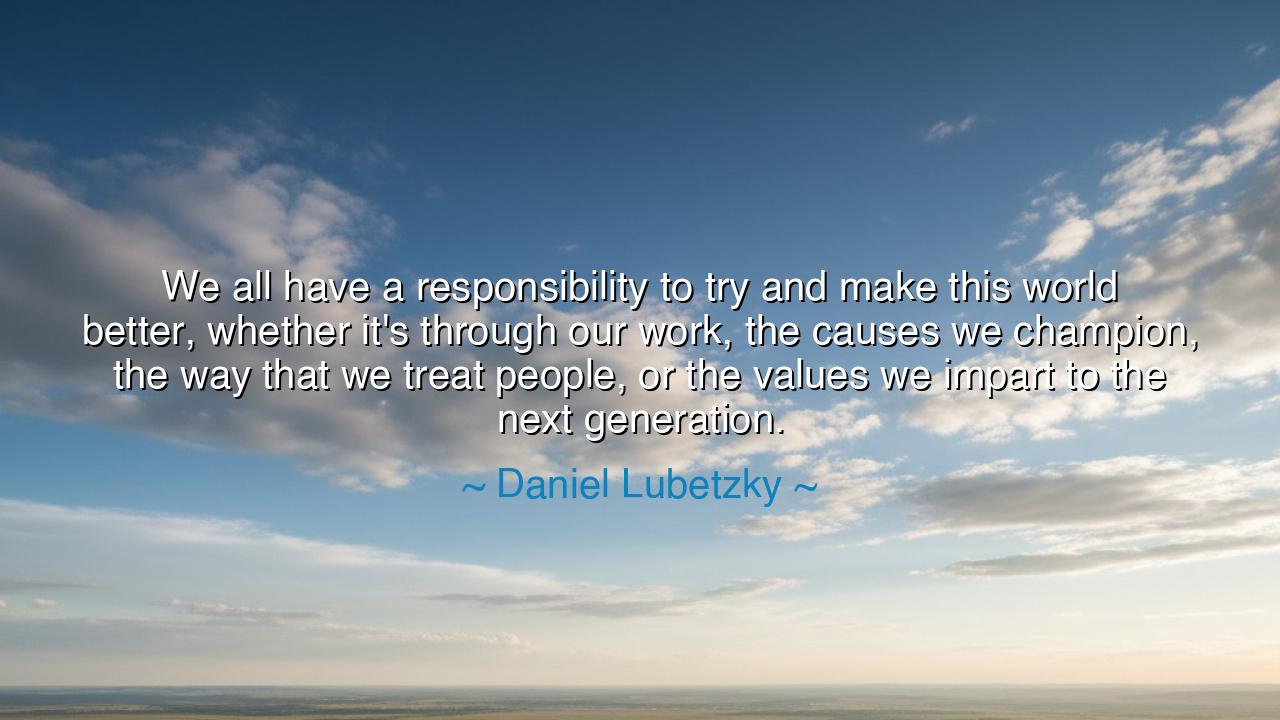
We all have a responsibility to try and make this world better
We all have a responsibility to try and make this world better, whether it's through our work, the causes we champion, the way that we treat people, or the values we impart to the next generation.






Hear the noble words of Daniel Lubetzky, who speaks as a steward of humankind: “We all have a responsibility to try and make this world better, whether it is through our work, the causes we champion, the way that we treat people, or the values we impart to the next generation.” These words are a summons to all who dwell upon the earth, calling each soul to rise beyond self-interest and to labor for the good of the whole. For no one is born merely to take; we are born to give, to shape the destiny of those who come after us.
From the dawn of ages, the wise have taught that the world is not ours to possess, but ours to tend, like a sacred garden entrusted to mortal hands. When we engage in work with purpose, when we champion causes of justice and mercy, we water the roots of this garden so that future generations may flourish. To neglect this duty is to let the soil grow barren, leaving only dust for those who follow.
But the greatest harvest lies not only in deeds, but in the way we treat people. Every act of kindness, every word of compassion, ripples outward like a stone cast into still waters. Though the gesture may seem small, its echoes reach far beyond what the eye can see. In this way, the heart becomes a torch, lighting paths for others to walk.
Lubetzky’s wisdom also reminds us of our sacred charge to the next generation. The values we impart to our children are seeds planted deep within their souls. If we plant seeds of honor, courage, and love, they will grow into mighty trees that shelter the future. Thus, the world becomes better not by chance, but through the deliberate choices of those who came before.
Let these words endure: greatness is not found in wealth or conquest, but in the quiet, steadfast effort to leave the world more radiant than we found it. When each soul takes up this responsibility, the darkness recedes, and humankind steps closer to the harmony it was always meant to know.






ATNguyen Anh Thu
Lubetzky’s quote really makes me think about the legacy we leave behind. Whether it’s the way we treat others or the values we pass on, our actions have a ripple effect. How do you think we can teach future generations to take on this responsibility? Is it about setting the right example, or do we need more structured efforts to create a culture of responsibility and empathy?
ATChuc anh thu
Daniel Lubetzky’s words are a call to action. We all have the power to make a difference, no matter how small our efforts might seem. But do you think people truly understand the weight of this responsibility? How can we make sure that we’re not just talking about making a better world, but actually taking meaningful steps to create change, both locally and globally?
DKVo Duy Khang
This quote is a powerful reminder of the impact we can have on the world, whether it's through our work, our values, or the way we treat others. But it also makes me wonder—how do we find the balance between trying to improve the world and taking care of ourselves? Can we contribute to society without burning ourselves out? How do we encourage others to do the same?
TNThu Tra Nguyen
I love how Daniel Lubetzky emphasizes personal responsibility in making the world better. It’s easy to get caught up in the idea that change has to come from governments or big organizations, but his point reminds us that we all contribute. How do you think we can better instill these values in the next generation? Should schools focus more on teaching social responsibility alongside academics?
MKDuong Thi My Kim
Daniel Lubetzky’s quote really resonates with me. It’s easy to feel like we don’t have much power to change the world, but he highlights how our actions, whether big or small, have an impact. Do you think the responsibility to improve the world falls more on individuals or larger institutions? Can individual actions really bring about significant change, or do we need to rely more on collective efforts?